- Home
- Alex Archer
Seeker’s Curse Page 10
Seeker’s Curse Read online
Page 10
She handed him the scrap of paper and explained succinctly how she got it. She saw no reason to hold anything back.
Pan’s only response to her bizarre account was to raise his eyebrows and nod. He did not project skepticism. She wondered what he’d experienced himself since arriving in the mountain kingdom.
He turned his attention to the plastic bag in his hand. Instantly his body language changed to resemble a hunting dog pointing out a pheasant in a nearby bush. He didn’t quiver with excitement, but did transition from relaxation to a taut, though not rigid, readiness.
“It’s in the Macedonian dialect of ancient Greek,” he said. “It’s a transcription.”
“I figured. I’d guess it’s several hundred years old. Certainly not 2300 years old. So it can’t be original. You can read it, yes?”
Absently he nodded. “Oh, yes,” he said. “The lamas must have copied it. Perhaps again and again. Most probably, few of the transcribers could have read it, although no doubt they translated it somewhere along the line.”
He raised his head to stare hard at the lamasery. Unlike many Buddhist monasteries and temples Annja had seen in Asia, it wasn’t gaily painted, aside from the splendid scarlet-lacquer-and-gilt door. Instead it was dark, whether painted or weathered that way. It showed unmistakable signs of having endured the turns of many harsh mountain seasons. Built of planks and posts and shakes of the native wood, presumably the very hemlocks that surrounded it up close, its steeply pitched roof and rough walls seemed a natural outgrowth of the forest itself.
Annja guessed Pan was holding a raging internal debate about pounding on the dragon door and demanding to be shown the rest of the manuscript the scrap came from. The archaeologist won out over the cop in him. He chose not to try throwing his weight around. She thought that wise, since his effective weight was an unknown quantity in the wilds of an alien land. In fact she could almost see him reach the same conclusion she had—this was what they were meant to have, so it had to satisfy them. For now.
“So what is it?” Annja said, rather irrationally angling to peer over his shoulder, trying to see through the dazzling highlights the bright mountain sun raised on the plastic bag. She still wouldn’t be able to read the paper even if she could see it.
“I can’t believe it!” he exclaimed. “This is a transcription of what purports to be a journal written by my ancient namesake. General Pantheras himself.”
“You’re kidding!”
Pan’s grin was enormous. “It’s true. Or at least, that’s what it says. Listen to this—
The yellow-robed monks seem to know of my quest. Although it is to despoil them of their tribute to their own chief god or seer, they do not resist, but smile and nod and assure me that my feet are on the proper path to the greatest treasure of all. Their easy acquiescence gives me greater pause than the fiercest resistance—which, after all, I expected to encounter.
Perhaps they intend to direct me deep into the jaws of a trap. If so, my duty to my king requires that I continue along my road.
“And where does that go?” Annja asked, feeling excitement sizzle in her veins.
Pan raised his head and extended his arm to point to the angular white head of Dhaulagiri peak, looming above the steep wooded hills that surrounded the lamasery and the valley.
THE MEN SEEMED TO FILL the district commissioner’s tiny office to overflowing. Like the waiting area it was dominated by giant color portraits of Chairmen Mao and Prachanda. The battered metal desk with chipped green enamel was bare except for a note-pad, several pencils lined up beside it, and an empty in-box and a teacup. Chatura’s chair was the same as the two his visitors occupied—wooden, with no arms and an uncompromisingly upright back. To one side a brass teapot bubbled on a hot plate atop a low bookcase stuffed with books of regulations and bound official documents.
“No, I don’t want tea,” Enver Bajraktari said in English. “It tastes like shit.”
“I am sure you’d know well,” the commissioner said in Gorkhali.
“What was that?”
“Nothing,” Chatura said in English with a thin smile. “A native benediction.”
“Huh,” said the flamboyantly mustached Kosovar with the dead milk-white eye. His bodyguard loomed like the shadow of a mountain behind him, thick arms folded over his chest. “Well. We bring you news from far places, comrade. Good news and bad.”
Chatura did not bother to try suppressing his distaste at being called comrade.
He refused to ask the question which, even in Nepal, popular culture made practically obligatory.
After a moment Bajraktari gave in. “I shall tell you the bad news first, my friend,” he said. “First, a meddling American woman named Annja Creed caused us to lose our last shipment to the Greek police. The good news is that the witch has come to Nepal.”
“How is it good news that this meddlesome Western woman has come here?” Chatura demanded. He didn’t see fit to mention he was well aware of the fact. He was too disappointed and angry at Bajraktari’s first information. He had a substantial investment in that shipment.
The foreigner grinned. “Because she’s on the trail of the greatest treasure trove in the Himalayas—the lost treasure of the Highest Shrine. All we have to do is follow her and she’ll lead us to unimaginable wealth. She’s here, is she not?”
Chatura conceded the fact with a slow nod. His scowl had if anything set harder.
“She is,” he said. “And I have already put Jagannatha on her trail.”
Bajraktari nodded. “Well, that’s a good thing, isn’t it? You have told me of this man. He is a bulldog who will not lose the witch, nor give up the trail.”
“You don’t understand. Although he is the regional commander of front-line revolutionary fighters, he is not objectively Marxist. He does not understand certain realities,” Chatura said.
The Kosovar cocked a brow at him. “I thought the major fought well in your revolution,” he said. “Not to mention successfully.”
Chatura made a low growling noise in his throat. Did this ridiculous gawky, hirsute barbarian dare to mock him for his less active role in the civil war? Bajraktari was a fool who had no understanding that without a proper theoretical foundation mere action was useless. It was men like himself, Chatura, who had done the real work of bringing the socialist revolution to this state. And small thanks he had received…
Chatura shook his head. Surely the foreign devil had no notion of what Chatura had done in the war. He was merely gibbering like the ape he was.
“The major is a hammer-headed fool,” Chatura said. “He is likely to persist until he kills this Creed woman or drives her away. And then we shall never claim the treasure for the proletarian revolution.”
Bajraktari showed him a humorless grin full of teeth stained brown by strong tobacco and uncertain dental hygiene. “Then you’d best make sure he doesn’t do any such foolish thing,” he said. “You are his commissar. Surely he will obey you.”
Chatura grunted again. He had better, he told himself.
He rose. “I shall order him to back off and merely observe what the intruder does.”
“What about us?” Bajraktari said, sprawling insolently in the chair despite the fact it couldn’t have been comfortable. Chatura had chosen the chairs to ensure his visitors were uncomfortable.
“You must return to the village and wait until I call you.”
Duka made an ominous sound in his throat like distant thunder over the White Mountain.
“I will send for you when I learn more,” Chatura said, steadfastly refusing to be intimidated by these European monkeys. “And now I bid you good day.”
15
“This is almost too good to be true,” Annja said. “We’ve got what looks like corroboration that our objective exists. And we’re literally following in General Pantheras’s footsteps! Can this be real? Is there any chance the document could be a fake?”
Pan laughed. “You think there’re many people in
these mountains who could write convincingly in the vernacular of ancient Macedonia?” he asked. “There must be fewer than a thousand living in all the world today. It’s easier for me to believe it is what it seems.”
“Me, too, since you put it that way,” Annja said.
They were walking along side by side up a trail covered with hemlock bark. The Nepalis stayed a respectful distance behind.
“You may be doubtful about having me underfoot,” Pan said. “I feel the same about outsiders in the line of my everyday work. Please remember, though, that I am also a colleague of yours, if still in training.”
He spread his arms wide and grinned at her. “Just think of me as that which every archaeologist most requires in the field—a graduate student!”
She looked at him a moment. “Do you know what you’re asking?” she said with mock severity.
“Oh, yes,” he said, dark eyes laughing. “You could hardly prove more tyrannical than Dr. Haralabos, under whom I made my first expedition.”
“Well,” she said, setting hands on hips, “watch me.”
“So, please fill me in on what’s happened since you arrived here,” Pan said.
To hide any hardening of expression or concern in her eyes Annja turned her face as if to look at a black-headed jay that scolded them from a high hemlock branch off to her left. They continued to climb higher. Once again their guides hadn’t told her where they were going. But by this point she felt both confident in putting her fate into the capable hands of Prasad and his clan, and needful of doing so. They had yet to locate anything of particular archaeological value. And she sensed that time to rescue the big prize, the Highest Shrine, wore thin.
She sensed Prasad come up closer behind them, as if innocently. She guessed he was interested to learn how much Annja would tell this newcomer.
For all that I trust Pan, she thought, and for all that I’m attracted to him, I’m sure not going to tell him about the encounter with Agrabat. At least in any detail.
He was a good man and a valuable ally, especially with the potential of having a wily and determined enemy like Major Jagannatha on their trail. Yet he was still a cop. He might revert to type at any time. Beyond doubt the gang’s dispatch by Annja and her guides had stretched local law to the breaking point. Concealing the deaths snapped those laws beyond repair.
So she gave him the redacted version. She alluded to an encounter with bandits but suggested that they had bluffed their way clear. She caught a furrowing of his dark brows, a sideways glance of his dark, liquid eyes. But he said nothing.
He suspects, she thought. But as long as he doesn’t know, he probably won’t press. As a police officer, especially a special operator as Pan was, he’d most likely sympathize with the way they’d dealt with their attackers. Just so long as he didn’t know for sure a major law breach had occurred, he could deal with it.
“So what about more organized opposition?” he asked, allowing the bandit encounter to drop. “You indicated we might be running afoul of the local Maoist guerrillas.”
Gratefully she tossed that off to Prasad and Lal. Bahadur had headed back alone to Baglung, leaving behind the two extra Sherpas who had accompanied him with fresh supplies. That brought her little expedition to eight. Enough for a little heft, not enough to get unmanageable.
She would have preferred more firepower than two old bolt-action guns, plus whatever sidearm Pan had brought along. The porters, however, like Lal and his uncle, all carried the big kukris, and she had witnessed how fearfully effective those were in close quarters. Still, against even a single assault rifle they could find themselves holding the seriously short end of the stick.
Prasad mostly let Lal fill Pan in on Jagannatha, interjecting as he deemed necessary. As always his words were few and to the point. All the same Annja learned more about the shadowy guerrilla chieftain. He had always been a maverick, it seemed, almost as great a headache to his superiors and fellow commanders as to the government forces.
“He does what he thinks is right,” Lal explained. “And his successes—he’s very crafty—make rival commanders look bad. They hate him for it, and they’re always looking to hurt him.”
“You sound as if you respect this man,” Pan said.
Lal shrugged.
“The wise warrior respects a worthy foe,” Prasad said. “I see you are a man who knows this thing.” Pan let that pass without comment.
“He’s an honorable man,” Lal said grudgingly. “Unlike most guerrillas.”
“It makes him the more dangerous,” Prasad said.
“Hmm,” Pan said. He glanced at Annja. She said nothing. This was a guy thing; she didn’t know him well enough to be sure he’d appreciate her actually offering an opinion at this point. Besides, she was intrigued to hear what the former Gurkhas would say without her tainting the discussion with their employer’s viewpoint.
“I’d have thought the other,” Pan admitted. “That someone who was treacherous and unscrupulous would prove the deadliest enemy.”
Prasad grinned. “Might it not be that even so seasoned a warrior as yourself has things yet to learn?” he asked. Though his tone was gentle, almost bantering and cheerful, Annja knew it was tantamount to a major smackdown. Pan’s blink a beat later confirmed that he’d caught that, too.
“His men are fanatically loyal to him,” Lal said. “Even though he enforces the old Maoist rules of war—which few enough other guerrillas do. Nor do the peasants hate and fear him the way they do most guerrillas. He respects them, their homes and their religion.”
“And the people are the water in which guerrilla fish swim,” Pan said.
“Yes,” Prasad said. “Though few sympathize with the Maoists they let Jagannatha swim where he wishes.”
“If the peasants aren’t Maoist, do they support the central government, then?” Annja asked. She knew it was perilous to intrude too deeply into local politics, but it could prove important. Anyway, she was curious.
Lal looked at his uncle, who shrugged. “Most just want to be left alone,” the young man said. “When I fought overseas, for the British and for the Indians, I learned that it’s much the same everywhere. Life on the land is hard for the people everywhere. Political struggles at best make it harder for them to feed themselves and their families. At worst—”
He shrugged. Annja nodded. She knew what the worst could look like. She’d seen some of it herself.
“How do you feel about all this?” she asked.
“We’re glad to see reform come to Nepal,” Lal said. Prasad’s face tightened ever so slightly. She guessed it was a touchy subject for him, that he had a deeply ingrained regard for the monarchy. Yet he didn’t contradict his nephew. “The people need more say in their own lives.”
“Isn’t that what the Maoists are fighting for?” Pan asked.
“So they say,” Prasad replied.
“We fight them because we see they’d be worse than what we have, regardless of corruption and abuse,” Lal said.
“And Jagannatha?” Annja asked.
“He fights because he fears what the West will do to our country more than what his own side would,” Lal said.
THE HEAVY WOODEN DOOR, blue paint cracked and peeling from overlong exposure to the harsh weather of the hillside, opened with a creak of hinges. The inside air that rushed out into the visitor’s face felt hot. It was redolent with the smells of human occupancy and cooking.
A family of four was gathered around a heavy table, about to eat their supper. Blunt peasant faces filled with alarm as they turned toward his. “Please forgive the intrusion,” the visitor said. “I need to ask you some questions.”
“You are Major Jagannatha,” the father said as the visitor pushed into the room. A pair of his men followed him. They had Kalashnikovs slung over their backs. Like him they wore heavy fur-lined local jackets and fur caps with long flaps. The major’s jacket hung open, revealing his khaki shirt—and the long holster he wore at his belt.
&nb
sp; “I am,” the visitor said. “I know there are Westerners intruding upon this land. Asking questions, prying secrets. I know that kinsmen of yours guide them. I wish to learn about them.”
“So that you can kill our kinfolk?” the youngest man flared. The only female in the room was the mother, who at a slow, insistent hand gesture from her husband laid her serving bowl upon the sturdy wood table and sat down. The speaker was her younger son.
“I have no wish to make war upon any Magar,” Jagannatha said, using the name that served both the tribe as a whole and as surname for its members. “I only need to know what the Westerners are up to.”
The woman lowered her face and looked at her hands, which intertwined helplessly in her lap. Her husband’s face was broad, flat, weathered, reddened by long exposure to sun, wind and chill. The peasant farmer said nothing.
“Will you kill us all if we don’t do what you want?” the youth asked.
The major’s eyes narrowed to slits in his own dark, grizzle-bearded face. Though a lifelong soldier who had never worked the land, he likewise bore the marks of wind and weather and sun.
“You know who I am,” he said.
The father was nervously eyeing the flapped cross-draw holster where Jagannatha carried his unmistakable long-barreled Chinese Type 80 pistol.
“Yes,” the farmer said.
“Then you know I follow Mao’s rules for revolutionary armies,” he said. “I insist that those who follow me do as well.”
“He doesn’t disrespect the shrines,” the mother said, reluctant to put herself forward, but eager to avoid any confrontation with this supremely dangerous man and his human wolves. “He doesn’t sneer at us who follow the great Lord Buddha.”
“That’s true,” the father said, nodding slowly. “You don’t bother the Hindus, either.”
Jagannatha wanted to tell them that he fought for them—for the peasants, for the people, for their culture and independence. But he couldn’t bring himself to speak the words—they brought on too much self-disgust.

 Rogue Angel: Forbidden City
Rogue Angel: Forbidden City The Spider Stone
The Spider Stone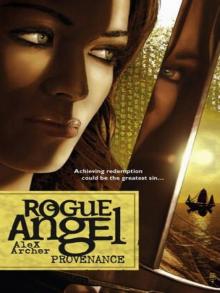 Provenance
Provenance Blood Cursed
Blood Cursed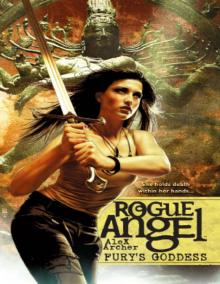 Fury's Goddess
Fury's Goddess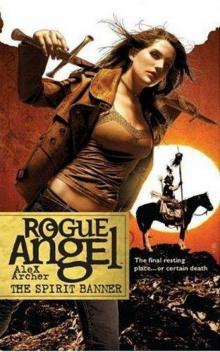 The Spirit Banner
The Spirit Banner Footprints
Footprints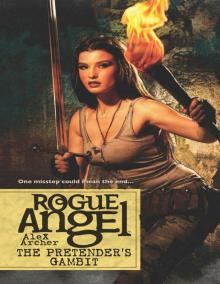 The Pretender's Gambit
The Pretender's Gambit Rogue Angel: The Lost Scrolls
Rogue Angel: The Lost Scrolls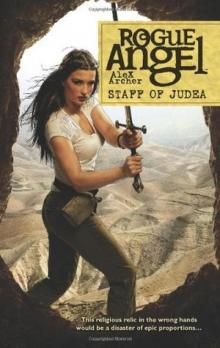 Staff of Judea
Staff of Judea Rogue Angel 55: Beneath Still Waters
Rogue Angel 55: Beneath Still Waters The Mortality Principle
The Mortality Principle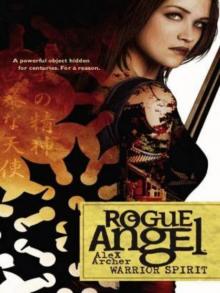 Warrior Spirit
Warrior Spirit Paradox
Paradox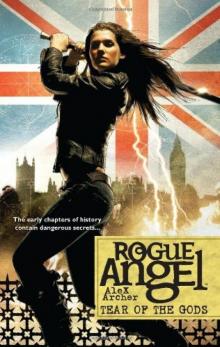 Tear of the Gods
Tear of the Gods Forbidden City
Forbidden City River of Nightmares (Rogue Angel)
River of Nightmares (Rogue Angel) Rogue Angel: The Secret of the Slaves
Rogue Angel: The Secret of the Slaves Destiny
Destiny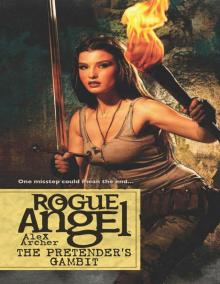 Rogue Angel 51: The Pretender's Gambit
Rogue Angel 51: The Pretender's Gambit Celtic Fire
Celtic Fire Rogue Angel 54: Day of Atonement
Rogue Angel 54: Day of Atonement Day of Atonement
Day of Atonement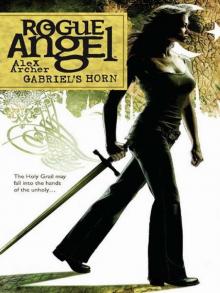 Rogue Angel: Gabriel's Horn
Rogue Angel: Gabriel's Horn Grendel's Curse
Grendel's Curse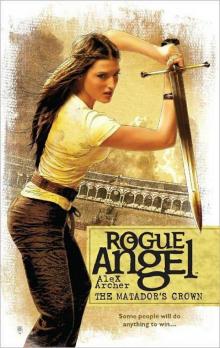 The Matador's Crown
The Matador's Crown Rogue Angel: The Chosen
Rogue Angel: The Chosen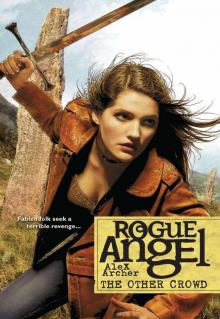 The Other Crowd
The Other Crowd Seeker’s Curse
Seeker’s Curse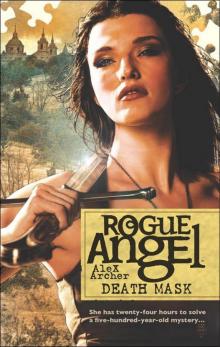 Rogue Angel 52: Death Mask
Rogue Angel 52: Death Mask The Golden Elephant
The Golden Elephant Blood Cursed (Rogue Angel)
Blood Cursed (Rogue Angel) Celtic Fire (Rogue Angel)
Celtic Fire (Rogue Angel)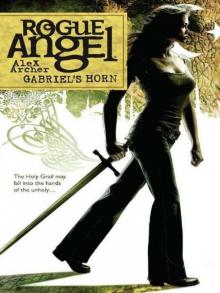 Gabriel's Horn
Gabriel's Horn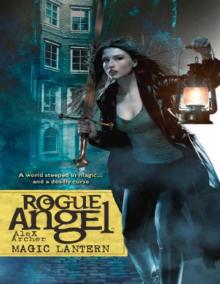 Magic Lantern (Rogue Angel)
Magic Lantern (Rogue Angel) God of Thunder
God of Thunder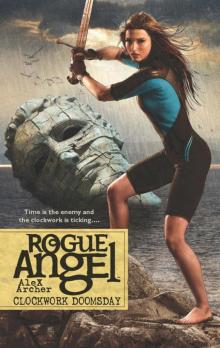 Clockwork Doomsday
Clockwork Doomsday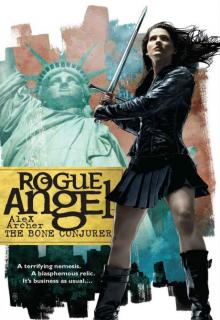 The Bone Conjurer
The Bone Conjurer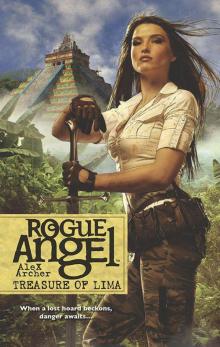 Treasure of Lima
Treasure of Lima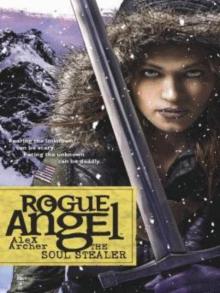 The Soul Stealer
The Soul Stealer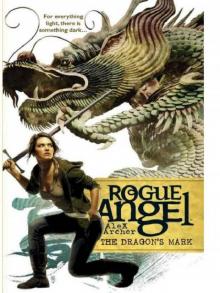 The Dragon’s Mark
The Dragon’s Mark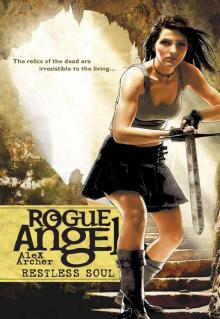 Restless Soul
Restless Soul Rogue Angel: God Of Thunder
Rogue Angel: God Of Thunder Rogue Angel 49: The Devil's Chord
Rogue Angel 49: The Devil's Chord Death Mask
Death Mask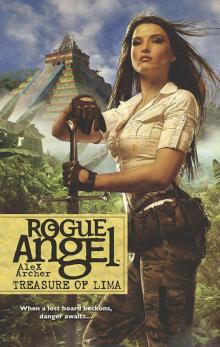 Rogue Angel 46: Treasure of Lima
Rogue Angel 46: Treasure of Lima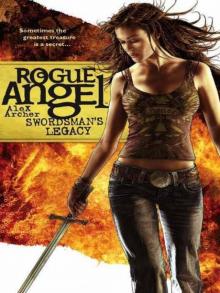 Swordsman's Legacy
Swordsman's Legacy The Oracle's Message
The Oracle's Message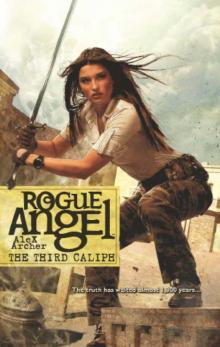 The Third Caliph
The Third Caliph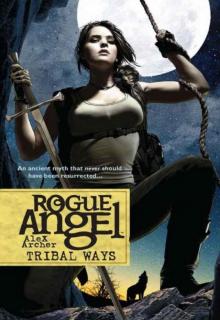 Tribal Ways
Tribal Ways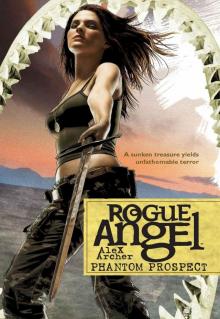 Phantom Prospect
Phantom Prospect Rogue Angel 50: Celtic Fire
Rogue Angel 50: Celtic Fire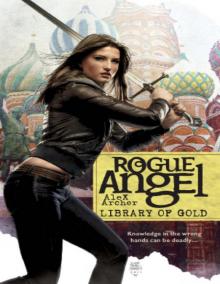 Library of Gold
Library of Gold Rogue Angel 53: Bathed in Blood
Rogue Angel 53: Bathed in Blood Sacred Ground
Sacred Ground The Devil's Chord
The Devil's Chord Serpent's Kiss
Serpent's Kiss The Vanishing Tribe
The Vanishing Tribe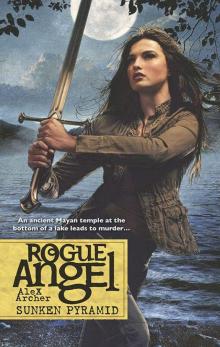 Sunken Pyramid
Sunken Pyramid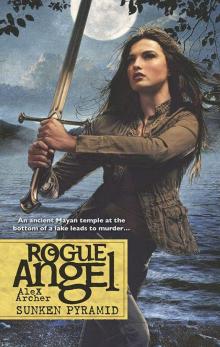 Sunken Pyramid (Rogue Angel)
Sunken Pyramid (Rogue Angel)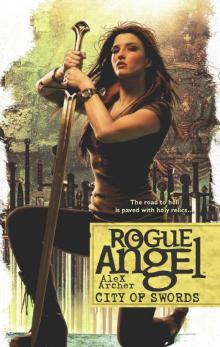 City of Swords
City of Swords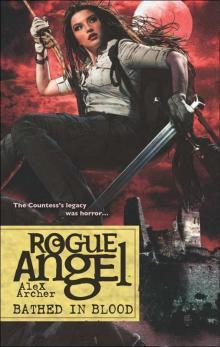 Bathed in Blood
Bathed in Blood The Lost Scrolls
The Lost Scrolls The Babel Codex
The Babel Codex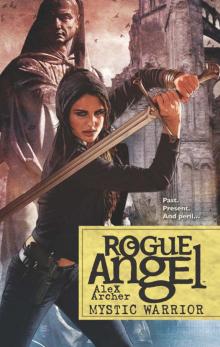 Mystic Warrior
Mystic Warrior Eternal Journey
Eternal Journey Beneath Still Waters
Beneath Still Waters Solomon's Jar
Solomon's Jar Beneath Still Waters (Rogue Angel Book 55)
Beneath Still Waters (Rogue Angel Book 55) Cradle of Solitude
Cradle of Solitude Secret of the Slaves
Secret of the Slaves River of Nightmares
River of Nightmares Polar Quest
Polar Quest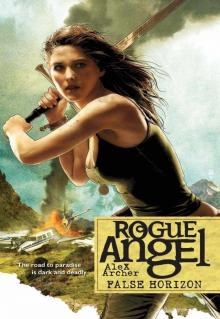 False Horizon
False Horizon